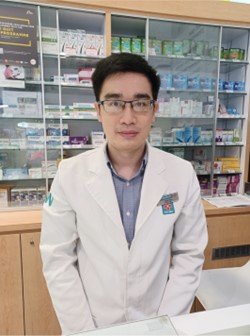Shining Star is a PSS initiative that features individuals who embody the exceptional qualities of a community pharmacist. In this issue, we shine the spotlight on Mr Clivia Yap from Watson's Personal Care Stores Pte Ltd.
I’m Clivia, currently a Senior Pharmacist practising in Watson’s Personal Care Stores Pte Ltd. So far, I’ve been practising here for 5 years, on top of completing my pre-registration training in the same institution. I was also certified as a Board-Certified Geriatric Pharmacist in 2022.
Aside from my usual practice in Watsons @ Vivocity, I’m also involved in various portfolios. I currently lead the Intermediate-Long Term Care portfolio at Watsons, which provides clinical services to settings with older adults, such as nursing homes. I am also the 2nd-in-charge in our Pharmacy Events and Projects team, which among other collaborations, managed our collaboration with Singapore Cancer Society for colorectal cancer awareness.
I am also actively involved in training pre-registration pharmacists and interns on their Pre-Employment Clinical Training. Therefore, my day in the pharmacy is filled with variety. I could be updating SOPs governing our services to nursing homes earlier in the day, then discussing questions that my pre-registration pharmacist may have later in the day.
What is the most memorable moment in your pharmacy career?
My most memorable moment was when I managed to quite confidently discuss an inquisitive patient’s tamsulosin treatment in response to his questions during a lull period in the pharmacy, which is not something that happens frequently in a community pharmacy setting. From that interaction, I really felt that I didn’t achieve board certification in vain. Of course, from that interaction, I also identified areas that I could have addressed better. After all, being a healthcare professional means lifelong learning is vital to improving our practices.
What helps/motivates you to stay in your practice? How do you harmonize work and family?
What motivates me to stay in my practice is first and foremost being able to see the difference I’m able to make when applying the skills and knowledge pharmacists possess. Beyond that, I believe resilience helps community pharmacists continue to stay in our practice, as it helps us persevere on despite the pressure we get from various sources.
I feel that harmonizing work and family requires us to maintain work-life balance. Part of that, in my opinion, requires us to work with our teammates, such as other pharmacists and pharmacy technicians, to help alleviate each other’s workload. Even now, I’m still learning to rely on my teammates, as this is antithetical to my initial perception that community pharmacists need to be able to work independently at all times.
What do you think are the important skills that a community pharmacist needs to be equipped with?
Ultimately, the clinical skills and knowledge expected of a pharmacist comes first, as it forms the foundation behind a pharmacist’s professionalism and the trust placed by the public in us. Beyond that, communication skills, especially listening skills, are important too. Due to the way our healthcare system is organized, for many patients, community pharmacists are the healthcare professionals who are most able to spend time listening and responding to their specific needs and preferences. Therefore, being able to communicate and listen well helps us address aspects of a patient’s care more holistically and helps to differentiate community pharmacy from other clinical settings.
What is one misconception about community pharmacists that you hope to correct?
Community pharmacists are not just limited to being drug dispensers, although improving safe access to medications is still very important. We can do more, such as medication reviews, medication reconciliation, drug information for patients and other healthcare professionals and so on. I always like to emphasise that we are healthcare professionals on par with other healthcare professionals, just equipped with different skills and knowledge to focus on another aspect of a patient’s care. That’s how we provide holistic care to a patient as part of a healthcare team.
Besides what I’ve mentioned above, if you feel that a community pharmacist’s scope of practice is limited, I recommend keeping an open mind and a lookout for opportunities to expand our scope of practice. While there are obstacles, I believe the opportunities are abound and our colleagues are very supportive.



